
views
Collecting the Eggs
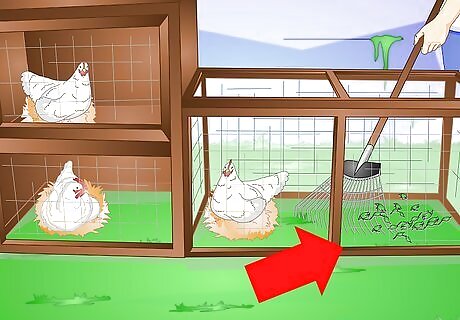
Keep the nest clean. One of the most important factors when you're raising chickens is keeping their environment clean and conducive to nesting. Make sure the chicken pen is spacious enough to accommodate your chickens and that the nesting area is well-maintained. Make sure you have at least one nest for every three to four chickens. The nests should be large enough to accommodate your hens. Use hay or wood shavings as litter in the pen and coop. This will help keep the eggs cleaner and reduce the chances of them being stained by mud or manure. Nest boxes should be cleaned out at least once every week, and the nesting materials (hay or wood shavings) should be replaced at that time.
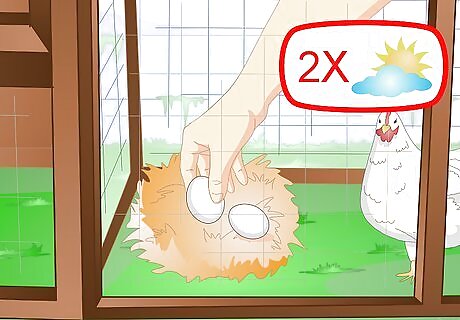
Collect eggs twice each morning. The longer an egg sits in the nest, the greater its chances of becoming broken, dirty, or unsafe to eat. An egg sitting out in extreme hot or cold weather is even more likely to be unsafe to eat, which is why regular collection is important. Go out to the chicken coop and gather your eggs twice each morning, preferably before noon. Some experts recommend listening for the sound of hens cackling loudly, as this can indicate that they're actively laying eggs. Try to space out your morning collections by a few hours to ensure you get all the eggs that are laid. Eggs with cracked or broken shells should be discarded immediately. Make sure you do not accidentally mix these eggs in with the ones you are keeping to prevent contamination.
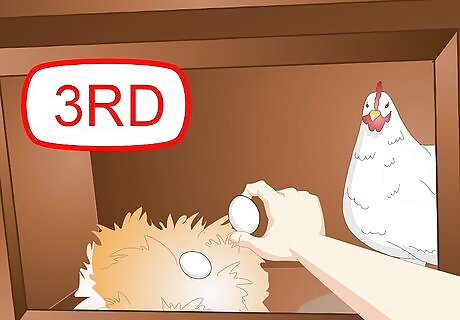
Return for a third collection. Depending on how many chickens you have and what kind of climate they are laying eggs in, you may need to consider a third collection. This should ideally be done in the late afternoon or early evening. That way your first two collections will gather any eggs laid overnight or in the morning, and your third collection will gather any eggs laid during the afternoon. Follow the same procedure for evaluating eggs. If any eggs are cracked or broken, discard them immediately.
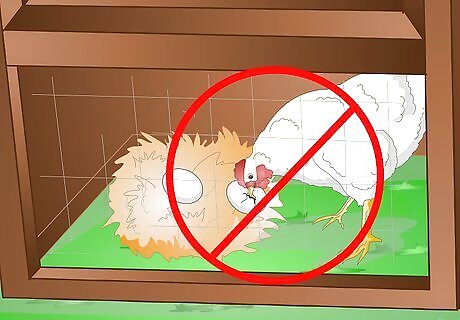
Prevent your chickens from eating eggs. Chickens are opportunistic eaters. A chicken won't know instinctively that she can eat her own eggs, but if she encounters broken eggs she will eventually try them. Chickens who have gotten a taste for eggs will quickly grow to like them, and may even begin breaking and eating eggs on their own. Remove broken eggs promptly to prevent your chickens from developing a taste for eggs. Throw out any straw or wood shavings that have egg yolk on them, and replace them with clean straw/shavings. Check for signs of yolk when you collect your eggs each day.
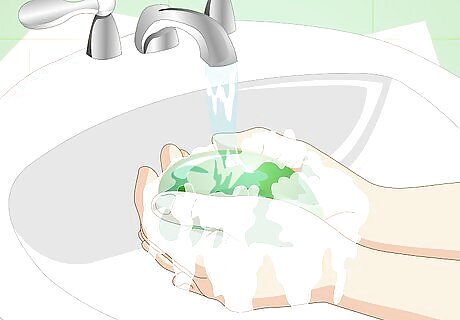
Keep yourself clean and safe. Raw eggs can carry bacteria, and so can just about anything in a chicken coop. Manure, mud, and even rodents can introduce harmful contaminants to your eggs. It's extremely important that you keep yourself clean and prevent the risk of disease by maintaining good personal hygiene and having any rodents exterminated. Do not use poison baits, as these may inadvertently poison your chickens, household pets, and other wildlife. Call an exterminator to deal with rats and mice so that they do not contaminate your eggs. Wash your hands with soap and warm water any time you handle eggs (whether or not they're broken), chickens, their bedding, or anything else from their environment. Never use your kitchen sink to wash food/water dishes that your chickens use. You may want to also wash your hands in a bathroom or outdoor faucet to avoid contaminating any dishes/cutlery in your kitchen sink.
Cleaning Eggs
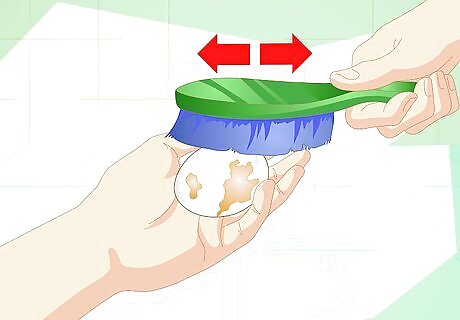
Gently scrub off debris. You won't need to do this with every single egg, but some eggs may be dirtier than others. Whether it's from mud, manure, or just environmental dirt, sometimes debris can become stuck on an eggshell that won't come off from mere washing. Use a brush to scrub dirty eggs clean. You can also use an emery cloth or a piece of fine sandpaper, but these materials will be far more difficult to disinfect. Do not scrub too hard or grip the egg too tightly or you may crack the shell. When you're done, you'll need to disinfect the brush. Dip it into a cup or small bucket containing warm bleach water after each batch of eggs that you scrub.
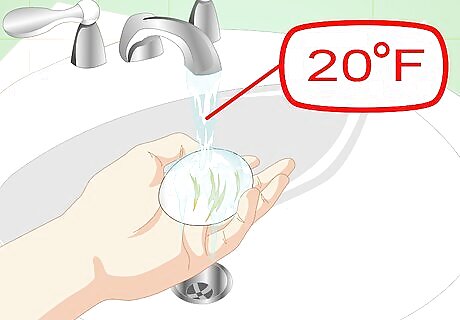
Run warm water. If eggs are washed in water that is cooler than the internal temperature of the eggs, it can cause the shell to contract, pulling water and microbes into the egg. This can lead to contamination, so it's very important to use warm water. Use water that is approximately 20 degrees Fahrenheit (6.7 degrees Celsius) warmer than the eggs. That means the water should be about 90 degrees Fahrenheit (about 32.2 degrees Celsius).
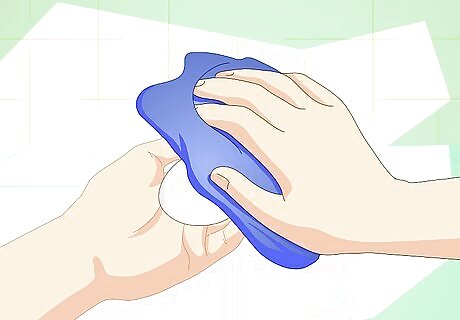
Wash the eggs clean. Once you've collected the eggs, it's important that you wash the eggs before storing/refrigerating them to ensure their safety. Wash them indoors using a sink with clean, potable water (your kitchen sink is ideal). You can wipe, spray, pour water over, or dip eggs to clean them, but you should never let them soak in water for any period of time. Soaking eggs for even 60 seconds can let dangerous microbes through the porous shell. Never let eggs soak, and take great care when cleaning them. If you use detergent to wash the egg, choose a mild, non-foaming, unscented soap that is gentle on your hands, like unscented dishwashing liquid. There are a number of commercial cleaning products designed for use with eggs. Unlike household cleaning chemicals, these are safe to use and can be purchased online or at farm supply stores. You can make your own cleaner by using distilled white vinegar diluted in half with water. Simply take a clean paper towel for each egg, dip the towel in your solution, and wipe the egg clean. Another way to sanitize eggs is by briefly dipping them in a solution of one tablespoon of bleach diluted in one gallon of warm water. Just be sure to rinse the eggs off afterwards to ensure that no bleach residue remains on the egg.
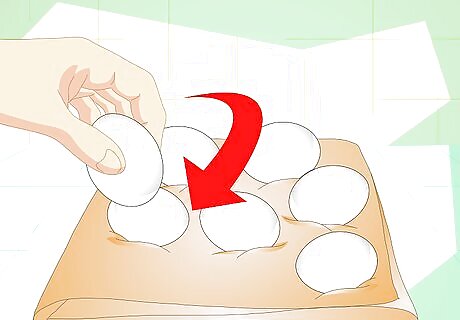
Dry the eggs before storage. It's very important that you dry the eggs before putting them in cartons or in storage. Eggs can be left on drying racks in your refrigerator, or dried with clean paper towels. Do not use cloth towels, though, as you'll need to discard the paper towels after drying your eggs.
Storing Eggs Safely
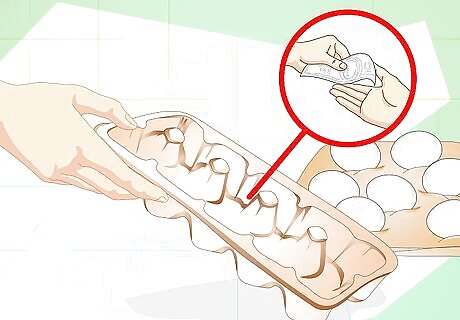
Buy new egg cartons. Eggs can be stored in egg cartons like the ones you get store-bought eggs in. However, because cardboard (and to a lesser extent, styrofoam) can easily absorb contaminants from the eggs, it's important that you use brand new cartons for each batch of eggs. Do not reuse cartons, as this can spread bacterial contaminants.
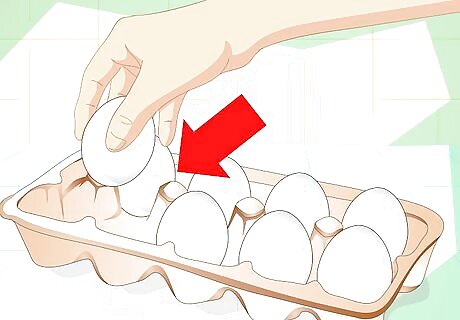
Arrange your eggs in cartons. Once you've purchased enough cartons to store your eggs, you can arrange them for storage. Place eggs "upside down," with the small ends down, in each carton. Write the date and the number of eggs in each carton on the exterior of the container. This can help ensure that your eggs are not past their shelf life.
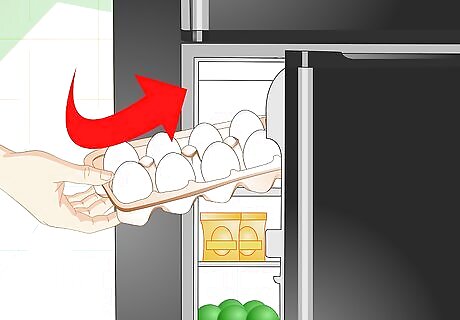
Keep eggs refrigerated. Once your eggs are cleaned and arranged in a brand new egg carton, you'll need to keep them refrigerated. Store them in the main section of your refrigerator, as the shelves on a refrigerator's door tend to be warmer than the interior. Eggs should always be washed before they are refrigerated. Store your eggs at 35 to 40 degrees Fahrenheit (1.67 to 4.44 degrees Celsius). Keep your eggs away from any foods or materials that have a strong odor, as the eggs will take on the environmental odor. Onions, fish, and potatoes are some of the worst offenders that you'll want to keep away from your eggs.
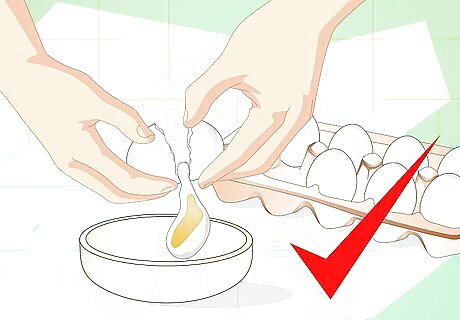
Use your eggs in a timely fashion. Store-bought eggs are usually sanitized and coated in a protective oil, which can increase their shelf life. However, your eggs will obviously not have such protections in place. Eggs also begin to lose quality once they're washed, so it's important to use them before they go bad. Eggs typically have a shelf life of less than five weeks. If you have too many eggs and they're at risk of going bad, you can freeze them. Crack the shells and pour the eggs into a freezer container, and add a small amount of salt or sugar to prevent gelling. Only freeze fresh eggs. Eat the ones that have been in storage the longest first.



















Comments
0 comment